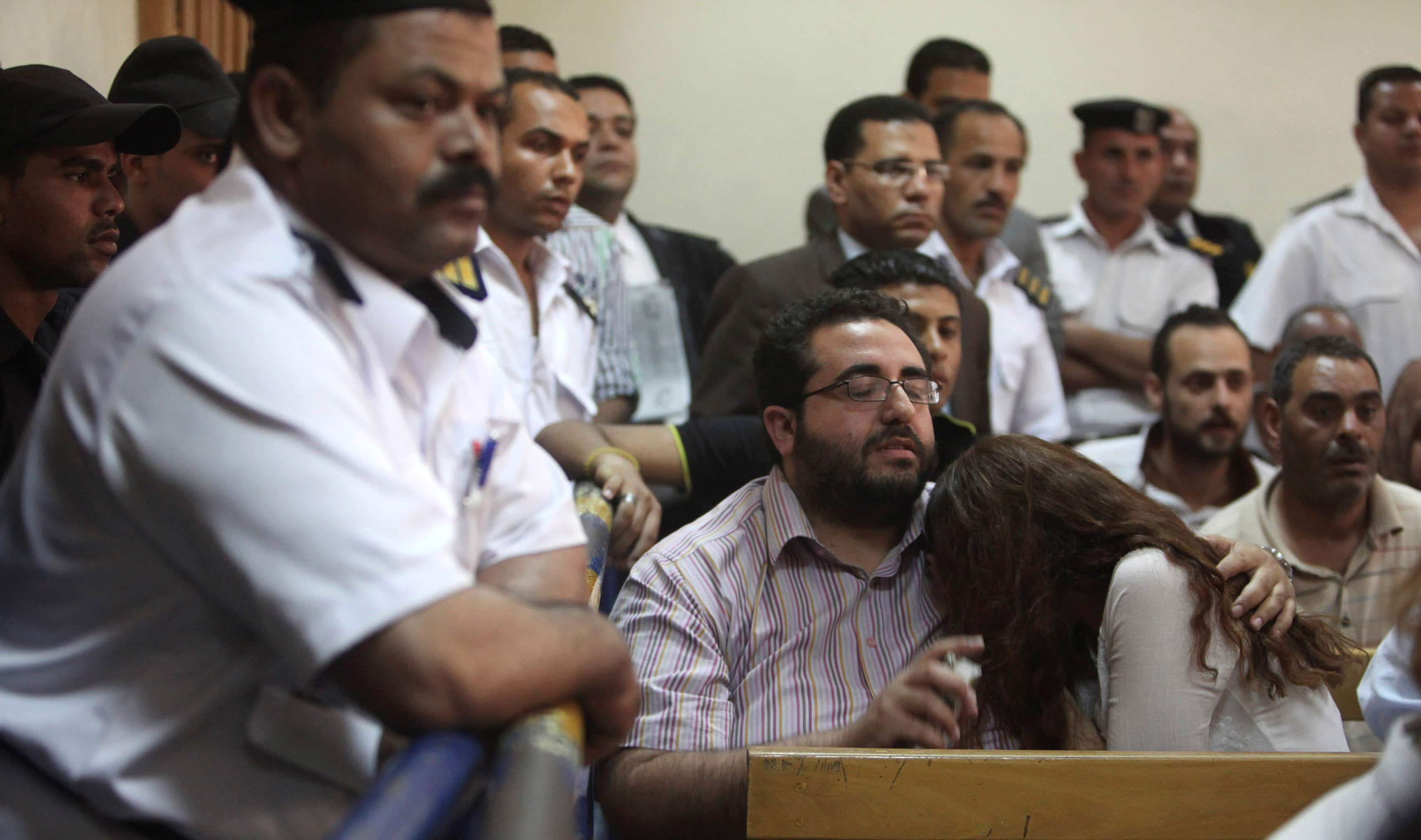The Cairo Criminal Court convicted 43 representatives of foreign NGOs in Egypt on charges of operating unlawfully in the country and receiving foreign funding without permission.
The Cairo Criminal Court’s conviction of 43 nongovernmental organization (NGO) workers on June 4, 2013, violates the right to freedom of association, Human Rights Watch said today. The convictions are based on a repressive law governing organizations as well as penal code provisions that are not compatible with respect for fundamental rights. The court convicted the 43 activists on charges of operating unlawfully in the country and receiving foreign funding without permission.
The verdict was handed down on the same day the Shura Council started to debate the presidency’s new draft law on nongovernmental organizations. The Egyptian president could address the violations of human rights raised by the investigation and trial in this case by pardoning those convicted, and amending the proposed new law regulating independent groups to bring it in line with international standards, Human Rights Watch said.
“These are unjust convictions based on an unjust law,” said Sarah Leah Whitson, Middle East and North Africa director at Human Rights Watch. “These workers for independent organizations should never have been charged in the first place. What’s particularly disheartening is that the new draft NGO law the Morsy government has proposed reflects the same suspicion of independent organizations that was the driving force behind the trial.”
The convictions violate basic internationally protected rights and the rule of law, Human Rights Watch said. The workers for these nongovernmental organizations have paid the price of a political disagreement between the Egyptian and US governments.
The investigation of the groups on trial, along with dozens of other Egyptian human rights organizations not registered under the Mubarak-era Law 84/2002 on Associations, was initiated by the international cooperation minister, Faiza Abul Naga, in the summer of 2011, when Egypt was under military rule. The trial opened in March 2012 against Egyptian and foreign staff of four US organizations and one German organization.
The court sentenced five of the workers to two years in prison and eleven others to a one-year suspended sentence. Those sentenced to two years are: Egyptian nationals Yehia Ghanem, Sherif Mansour, and Mohamed Abdelaziz; Robert Becker of the US; and Christine Baade of Germany. In addition, 27 defendants were tried in absentia and the court sentenced them to five years, an automatic conviction because they were not present during the trial.
Under the Law on Associations, the court also ordered the seizure of all assets and closure of all branches of the International Republican Institute, the National Democratic Institute, Freedom House, the International Center for Journalists, and the Konrad Adenauer Foundation.
The convicted workers may appeal the conviction before the Court of Cassation on the grounds that there has been an error in law, and seek a retrial. The president also has a discretionary power under the constitution and the code of criminal procedure to issue a pardon.
The workers were charged under article 98(c)(1) of Egypt’s penal code, which states: “Anyone who creates or establishes or manages an association or organization or institution of any kind of an international character or a branch of an international organization without a license in the Egyptian Republic shall be punished with imprisonment for a period of not more than 6 months or with a fine of 500 EGP [US$82].” The defendants were also charged under the penal code with receiving funds without authorization, which can carry a penalty of up to five years in prison.
In January 2012, Human Rights Watch submitted a legal brief to parliament urging members to amend the repressive legal framework of the Mubarak era including the Law on Associations and penal code provisions on association. The Mubarak administration used these provisions to imprison peaceful political opponents. It arrested thousands of members of the officially banned but tolerated Muslim Brotherhood, which renounced the use of violence in the 1950s, on grounds of “membership in an illegal organization” (article 86 of the penal code) simply for expressing views sympathetic to the Brotherhood.
Under international law, membership of an unrecognized association cannot in and of itself amount to a crime. The one limitation is if the association openly calls for violence. The wording of article 98 of the penal code is particularly broad and includes language that criminalizes legitimate nonviolent political activity and organizing. The International Covenant on Civil and Political Rights, which Egypt has ratified, prohibits broadly worded bans on nonviolent political activity.
The notorious 2002 Law 84 on Associations impedes the right of Egyptians to operate independent associations. It gives the government broad leeway to refuse or withhold licenses and to otherwise intervene in the registration, governance, and functioning of nongovernmental organizations.
The Egyptian presidency published its latest draft of a new law to regulate nongovernmental groups on May 29 and submitted it to the Shura Council for further debate. Despite some improvements compared to previous drafts, the May 29 draft falls far short of meeting Egypt’s international human rights obligations, Human Rights Watch said.
It would reinforce and formalize state control over nongovernmental groups by empowering the government to deny them access to both domestic and international funding. It would also give the authorities complete discretion to object to activities of Egyptian and international organizations, including human rights groups, that document or criticize rights abuses by the government.
The presidency’s new draft law does not include additional prison sentences, but article 70 incorporates the penal code provisions by stating in the first sentence “without prejudice to any harsher penalties in the penal code or any other law.”
“If President Morsy wishes to distance himself from the legacy of this politically motivated trial, he should amend the new draft NGO law in line with international standards instead of pushing through a law which would allow the government to control and block independent organizations.” Whitson said.



